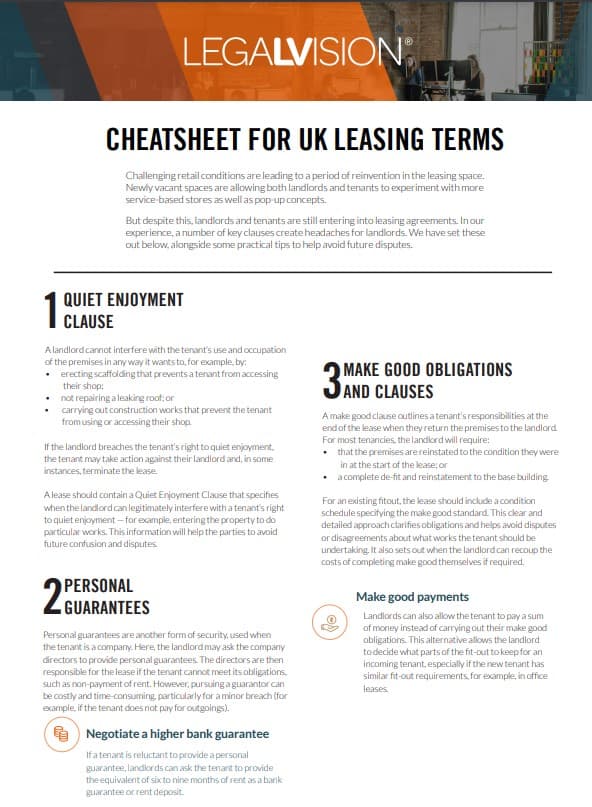Table of Contents
Commercial leases grant a business owner the right to use a commercial property as their business premise. In return, the tenant pays their landlord’s rent. However, there is much more to understand than this about commercial leases. Commercial lease agreements contain many provisions which outline the rights and obligations of a landlord and their tenant. To highlight some of the points about commercial leases, we have chosen three key points commercial landlords and tenants should know in a lease in this article to start you off.

This cheat sheet outlines what you should be aware of in your lease agreement.
1. Contracted-Out or Security of Tenure?
A vital point commercial landlords and tenants should understand in a lease is whether or not the lease is a:
- contracted-out lease; or
- a lease with security of tenure.
Generally, the relevant security of tenure provisions of the Landlord and Tenant Act 1954 automatically applies to most leases. Security of tenure protects the commercial tenant at the lease end term by granting the automatic legal right of lease renewal. As a result, a landlord can only refuse renewal on seven reasonable legal grounds.
On the other hand, a lease agreement can ‘contract out’ of the automatic provisions. As a result, the lease does not renew at the lease end term, and the commercial tenant and landlord to decide whether to enter a new lease.
2. Rent Review Clause
Rent review clauses are a crucial point commercial landlords and tenants should understand in a lease. This is because a rent review clause affects the level of rent a tenant pays and the landlord receives.
A rent review clause gives a commercial landlord the right to assess the level of rent their tenant pays at a specific point in the lease term. The rent will either remain the same or increase, although it can never decrease.
The landlord reviews the rental amount, although the way they conduct their review depends on the rent review method specified in the lease agreement. This could be through:
- an open market rent review, which assesses rent depending on the amount of rent a similar property would go for on the market at that time;
- an index-linked rent review such as the retail price Index (RPI); or
- a stepped rent review.
Therefore, it is essential to know that where a lease contains a rent review clause, the level of rent will increase at some point during the lease term. However, both parties should know that a commercial tenant can dispute this.
Continue reading this article below the formCall 0808 196 8584 for urgent assistance.
Otherwise, complete this form and we will contact you within one business day.
3. Termination
In addition to understanding key points in a commercial lease about rent reviews and contracted-out or protected leases, a crucial point to understand is about termination of leases. Both landlords and tenants should understand that a commercial lease has a fixed term. This means that once the lease reaches this lease end date, the lease is brought to an end and is no longer a commercial lease. However, this is not the case if it is a protected lease, as explained earlier.
A key point to note about the termination of a commercial lease is that it can occur in multiple ways. A lease can also terminate if a landlord forfeits the lease. A commercial landlord may do this when:
- the agreement says they can; and
- a tenant commits a serious breach of the lease terms, such as a failure to pay rent.
A further example of how a lease can terminate is when it contains a break clause. This lease provision allows a party to the lease to end the lease in certain circumstances as long as parties to the lease fulfil specific conditions in the clause details.
Key Takeaways
If you are a commercial tenant or landlord, there are many points to understand about commercial leases. This includes:
- knowing whether your lease is a contracted-out lease or not;
- the implications of a rent review clause in commercial leases; and
- the termination of a commercial lease through various means, such as lease forfeiture or where a party to the lease uses the break clause.
If you need help understanding key points commercial landlords and tenants should know in a lease, LegalVision’s experienced leasing lawyers can assist as part of our LegalVision membership. For a low monthly fee, you will have unlimited access to lawyers to answer your questions and draft and review your documents for a low monthly fee. So call us today on 0808 196 8584 or visit our membership page.
We appreciate your feedback – your submission has been successfully received.







